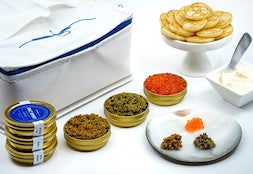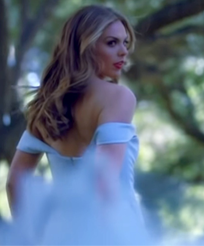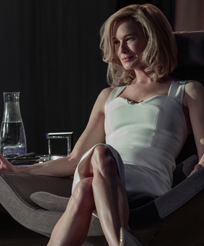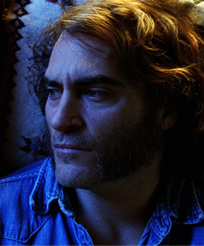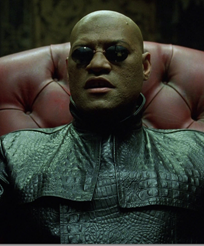Stephanie Danler moved to New York in the mid-aughts and got a job at Danny Meyer’s famed Union Square Cafe, then wrote a best-selling novel called Sweetbitter based, at least somewhat, on her experience there, before adapting said novel into an eponymous series for Starz, the set for which—a fully-functioning three-story restaurant—she can recall hanging out in, past midnight, typing away on her laptop.
“Wait a second,” she remembers thinking, while perched at the set’s restaurant’s bar, “this feels very familiar. I think I’ve already lived this.”
It may sound like a boggling meta mindfuck—doing the very same thing in the restaurant built for the show based on the book based on your life as you did in the real restaurant where it all began—but it also makes a strange sort of sense: of course she is here, now, doing this.
Sweetbitter, which screened at last month’s Tribeca Film Festival and premieres Sunday, follows 22-year-old Tess (Ella Purnell), an ostensibly winsome girl who moves to New York on a whim, with no friends or job prospects to speak of, and manages to finagle a trial position as a back-waitress at one of the nicest restaurants in the city. There, she falls in with the restaurant’s thrown-together family: bristly chefs, friendly dishwashers, fatherly bartenders, a prickly-kind Russian immigrant named Sasha (Daniyar), a comely peer named Will (Evan Jonigkeit) and, most critically, Simone (Caitlin FitzGerald) and Jake (Tom Sturridge)—a tempestuous pair of employees with an enigmatic past. Despite warnings from the others, Tess looks up to Simone, an exemplary waitress with an impeccable palate and the kind of literary-chic apartment you only read about in books; and despite warnings from Simone, she also develops a crush on Jake, a smoldering Gen-X bad boy-type forced into a preppy button-down shirt. Just six half-hour episodes long, the first season is deliciously sexy, sharp and well-paced, even if it takes some time to meander; the pressurized air of the sophisticated restaurant, and the work it takes to make things look and feel and taste effortless, is, perhaps unsurprisingly, ripe for scripted television.
Unlike the book, which is written in the first-person from Tess’s point of view, the show allowed Danler to tell richer stories about her supporting cast of characters. Still, Sweetbitter is primarily a coming-of-age story, defined as much by where it’s set as when: 2006, before the ubiquity of social media and the dawn of iPhones, which, in a narrative sense, “obliterates a lot of the action.”
“It’s the last time where you could wonder something,” Danler says, almost dreamily. “It’s the last time you can get lost. It’s really the last time when you had to go experience something in order to know it.”
For a fresh-faced girl in New York, the relatively analog quality of the mid-aughts imbues Tess’s otherwise of-today journey with a refreshing sense of urgency. There’s no Tinder for random hookups; no iPhone GPS for directions. When she can’t Google things, she has to look for them; when she can’t go home, she has to go with the flow, wherever that flow takes her, whether it be a hole-in-the-wall Chinese restaurant or a penthouse party or a dingy industry dive bar. The familiarity of the recent past serves as a reminder of just how much has changed.
“We’re really cognizant of not letting it be a fairy tale, and letting the loneliness stand out,” Danler says, “which is a different beast in 2006 as well. It’s possible to actually be alone.”
Tess is, as Danler says, a “blank slate,” desperate not to get something but to want something—whatever that something may be. She tries everything offered to her with a newcomer’s reluctant zeal—oysters, wine, booze, pills, coke, sex, shaving a man’s legs. Her sexual awakening is part of a greater sensual awakening—both in and out of the kitchen—the visceral nature of which Danler and the show’s directors don’t shy away from exploring.
“After college, you don’t know what you’re supposed to do, what you’re supposed to want,” Danler says. “You wonder every day, ‘When am I going to feel like an adult?’ So you start pressing all these buttons, testing your freedom.”
In one telling scene from the first episode, Jake sneaks Tess into the walk-in refrigerator before a shift and feeds her an oyster. She’s never tried one before. He asks her what she tastes, and she answers, forthrightly, that it tastes like salt.
“It’s just ‘I like this, I don’t like this,’” Danler remarks. “She’s really just beginning to develop her palate, but also her ability to discern the good and the bad in a larger sense.”
Danler, now in her 30s, is at work on a second novel, as well as the second season of Sweetbitter. Yet she is understandably nostalgic for those exciting days of unknowing. If anything, though, the show appears to have helped clarify, rather than glorify, that time period.
“I think I almost found something truer to my life in the show than I did in the book, because we were in these locations and we were building a restaurant, and nothing was abstract or universal,” she says. “It was very specific. We’re on the streets of New York. We’re on the Williamsburg Bridge at 2am. And that looks like life.”


